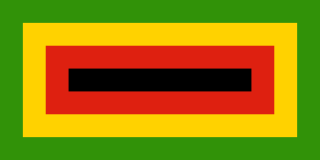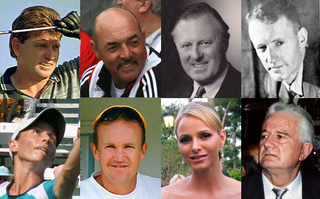
Harare, formerly Salisbury, is the capital and largest city of Zimbabwe. The city proper has an area of 982.3 km2 (379.3 sq mi), a population of 1,849,600 as of the 2022 census and an estimated 2,487,209 people in its metropolitan province. The city is situated in north-eastern Zimbabwe in the country's Mashonaland region. Harare is a metropolitan province which also incorporates the municipalities of Chitungwiza and Epworth. The city sits on a plateau at an elevation of 1,483 metres above sea level, and its climate falls into the subtropical highland category.

Zimbabwe Rhodesia, alternatively known as Zimbabwe-Rhodesia, also informally known as Zimbabwe or Rhodesia, was a short-lived sovereign state that existed from 1 June 1979 to 18 April 1980, though it lacked international recognition. Zimbabwe Rhodesia was preceded by another state named the Republic of Rhodesia and was briefly under a British-supervised transitional government sometimes referred to as a reestablished Southern Rhodesia, which according to British constitutional theory had remained the lawful government in the area after Unilateral Declaration of Independence (UDI) in 1965. About three months later, the re-established colony of Southern Rhodesia was granted internationally-recognized independence within the Commonwealth as the Republic of Zimbabwe.

The Zimbabwe African National Union – Patriotic Front (ZANU–PF) is a political organisation which has been the ruling party of Zimbabwe since independence in 1980. The party was led for many years by Robert Mugabe, first as prime minister with the Zimbabwe African National Union (ZANU) and then as president from 1987 after the merger with the Zimbabwe African People's Union (ZAPU) and retaining the name ZANU–PF, until 2017, when he was removed as leader.
Air Zimbabwe (Pvt) Ltd is the national carrier of Zimbabwe, headquartered on the property of Robert Gabriel Mugabe International Airport, in Harare. From its hub at Robert Gabriel Mugabe International Airport, the carrier used to operate a network within southern Africa that also included Asia and London-Gatwick. Following financial difficulties, Air Zimbabwe ceased operations in late February 2012. Serving a reduced domestic network, the carrier resumed operations for a short period between May and early July 2012, when flights were again discontinued. Some flights were restarted on a discontinuous basis in November that year. The airline resumed operating some domestic routes as well as the regional service to Johannesburg on a daily basis in April 2013.

The National Railways of Zimbabwe (NRZ), formerly Rhodesia Railways (RR), is a Bulawayo headquartered state-owned enterprise that operates the country's national railway system. It was established in 1893 and is governed by an Act of Parliament. It has a commercial-administrative center in Harare and a supply center in Gweru. The Zimbabwean railway system was largely constructed during the 20th century.

White Zimbabweans, also known as White Rhodesians or simply Rhodesians, are a Southern African people of European descent. In linguistic, cultural, and historical terms, these people of European ethnic origin are mostly English-speaking descendants of British settlers. A small minority are either Afrikaans-speaking descendants of Afrikaners from South Africa or those descended from Greek, Portuguese, Italian, and Jewish immigrants.

The Zimbabwe national rugby union team, nicknamed the Sables, represents the Zimbabwe Rugby Union in international competition. While sides representing the colony of Rhodesia have played as early as 1910, the modern day Zimbabwe rugby team did not play its first test until 1981, against Kenya. Zimbabwe has competed in two World Cups, in 1987 and 1991, in place of South Africa, who were sanctioned by the IRB at the time due to apartheid. Zimbabwe is categorized as Tier 3 Development One, which prioritizes Zimbabwe over other nations due to historical success as well as popularity of rugby in the nation.

The Logan Cup is the premier domestic first-class cricket competition in Zimbabwe and is organised by Zimbabwe Cricket. It is named after James Douglas Logan.
Milton Senior Boys High School is a government all-boys high school located in Bulawayo, Zimbabwe. It was the first government all-boys school established in Bulawayo. It was founded in 1910 and is named after Sir William Milton, administrator of the British South Africa Company. The school's motto is Greek and derived from the Biblical excerpt from Corinthians, 1 Corinthians 16:13, written by St. Paul to Corinthians in the face of Roman imperialism, and the Authorized Version translates it as "Quit ye like men". Milton school's connection with St. John's is perpetuated in the new church in Rhodes Street where the central light of a stained glass window in the east transept in memory of an old boy, Alfred Perry, depicts the school's crest and motto.

David Coltart is a Zimbabwean lawyer, Christian leader and politician. He was a founding member of the Movement for Democratic Change when it was established in 1999 and its founding secretary for legal affairs. Coultart was the Member of Parliament for Bulawayo South in the House of Assembly from 2000 to 2008, and he was elected to the Senate in 2008. He was the Minister for Education, Sport, Arts and Culture from February 2009 until August 2013.

Christianity is the most widely professed religion in Zimbabwe, with Protestantism being its largest denomination.

The history of the Jews in Zimbabwe reaches back over one century. Present-day Zimbabwe was formerly known as Southern Rhodesia and later as Rhodesia.
The following is a timeline of the history of the city of Harare, Zimbabwe.

The Zimbabwe men's national field hockey team is the team that represents Zimbabwe in the sport of field hockey. Field hockey has the second biggest player base in the country after football. Currently, Zimbabwe has four pitches, two in Bulawayo – one water base and one sand filled – and another sand filled at the Arundel School and water base at St John's College in the capital city of Harare. Bulawayo has approximately 1,000 hockey players and Harare 8,000. The 5,000-capacity Khumalo Hockey Stadium in Bulawayo is their home stadium. Field hockey club Skies Hockey Club also use the venue for home games. They are currently ranked 61st in International hockey ranking. While the country had a tradition in the sport, they struggled in recent times largely due to their inability to participate in international competitions organized by the African Hockey Federation (AfHF) and the International Hockey Federation (FIH), until the Khumalo Hockey Stadium was refurbished and played host to the 2011 African Olympic Qualifier.
The following is a timeline of the history of the city of Bulawayo, Zimbabwe.
The Mayor of Mutare is the executive of the government of Mutare, Zimbabwe. The Mayor is a member of the Mutare City Council, and is assisted by a deputy mayor. The Mayor uses the style "His Worship". The current mayor is Simon Chabuka.
Elias "Elly" Broomberg was a South African-born Rhodesian businessman and politician. Born and raised in Johannesburg, he emigrated to Southern Rhodesia in 1956 and co-founded a textile company in Bulawayo. First elected to Parliament in 1970, he was named Minister of Commerce and Industry by Prime Minister Ian Smith in 1974. Two years later, he was named Minister of Information, Immigration, and Tourism. He chose not to run for reelection in 1977, and after leaving both Parliament and the Cabinet, died the same year.
Michael Theodore Hayes Auret was a Zimbabwean farmer, politician, and activist. A devout Catholic, he served as chairman and later director of the Catholic Commission for Justice and Peace in Zimbabwe (CCJP) from 1978 until 1999. He also served as a member of Parliament for Harare Central from 2000 to 2003, when he resigned and emigrated to Ireland.

Callistus Dingiswayo Ndlovu was a Zimbabwean academic, diplomat, and politician. He joined the Zimbabwe African People's Union (ZAPU) in 1963 as a teacher in Matabeleland, and went on to serve as its representative to the United Nations and North America in the 1970s. After Zimbabwe's independence in 1980, he was a member of the House of Assembly from 1980 to 1985 and served as a senator from 1985 to 1990. He left ZAPU and joined the ruling ZANU–PF party in 1984.













